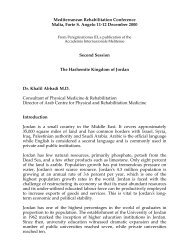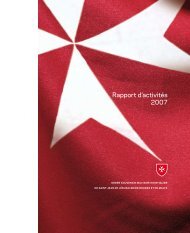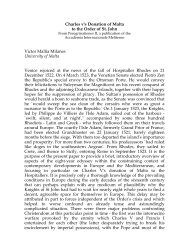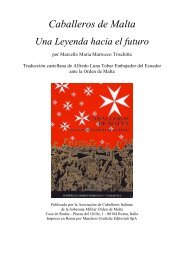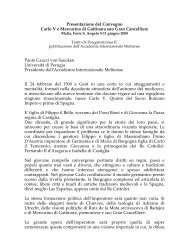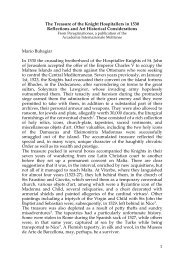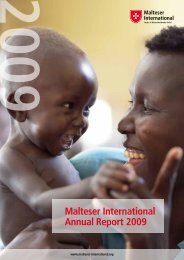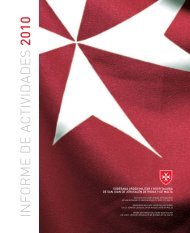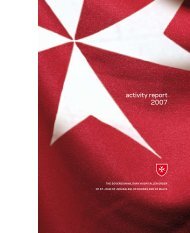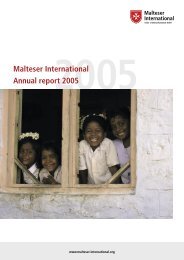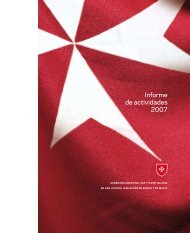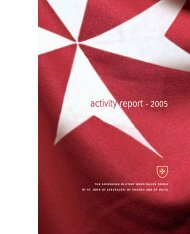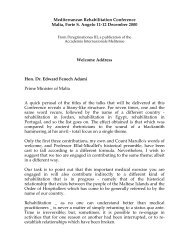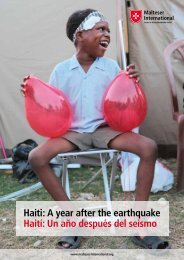we love to care â order of malta relief activities in central and eastern ...
we love to care â order of malta relief activities in central and eastern ...
we love to care â order of malta relief activities in central and eastern ...
Create successful ePaper yourself
Turn your PDF publications into a flip-book with our unique Google optimized e-Paper software.
Together on pilgrim’s ways – Ukra<strong>in</strong>e<br />
Christian values are at the heart <strong>of</strong> all the <strong>relief</strong> organisations’<br />
work <strong>of</strong> the Order <strong>in</strong> Central <strong>and</strong> Eastern Europe. Young people<br />
are encouraged <strong>to</strong> experience their faith <strong>and</strong> spirituality dur<strong>in</strong>g<br />
communal <strong>activities</strong>. For many people who have <strong>to</strong> live with a<br />
h<strong>and</strong>icap, spirituality <strong>and</strong> participation <strong>in</strong> religious events have<br />
become ultimate resources <strong>in</strong> help<strong>in</strong>g them <strong>to</strong> cope with everyday<br />
challenges. Hav<strong>in</strong>g been neglected for ideological reasons dur<strong>in</strong>g<br />
communism, a lot <strong>of</strong> famous pilgrimage sites have been revitalised<br />
<strong>in</strong> the beg<strong>in</strong>n<strong>in</strong>g <strong>of</strong> the n<strong>in</strong>eties. Univ for example is one <strong>of</strong> the<br />
oldest thriv<strong>in</strong>g <strong>to</strong>wns <strong>in</strong> the Ukra<strong>in</strong>e, tell<strong>in</strong>g the s<strong>to</strong>ry <strong>of</strong> the Blessed<br />
Virg<strong>in</strong> who came <strong>to</strong> rescue a governor from a deathly illness. In<br />
1991 monastic life <strong>and</strong> pilgrimage returned <strong>to</strong> Univ. Youth groups<br />
have gone on pilgrimages <strong>to</strong> Univ s<strong>in</strong>ce 1994. MSD <strong>in</strong>vites everybody<br />
<strong>to</strong> jo<strong>in</strong> the pilgrimage once a year. The young pilgrims have<br />
<strong>to</strong> walk a distance <strong>of</strong> 64 kilometres with<strong>in</strong> two days. What makes<br />
the whole event so special is that also a number <strong>of</strong> physically<br />
disabled people are able <strong>to</strong> jo<strong>in</strong> <strong>in</strong><strong>to</strong> the group. MSD’s responsibilities<br />
dur<strong>in</strong>g the trip are the provision <strong>of</strong> hot meals, medical aid<br />
<strong>and</strong> technical support as <strong>we</strong>ll as special <strong>care</strong> for the disabled<br />
participants. Most <strong>of</strong> the other organisations have taken the same<br />
approach <strong>and</strong> organise regular pilgrimages <strong>to</strong> different locations <strong>in</strong><br />
Central <strong>and</strong> Eastern Europe <strong>and</strong> <strong>to</strong> Lourdes.<br />
Therapeutic approaches <strong>to</strong> everyday<br />
challenges - Pol<strong>and</strong><br />
The aim <strong>of</strong> occupational therapy is <strong>to</strong> enable people with disabilities<br />
<strong>to</strong> live as <strong>in</strong>dependently as possible – at home, <strong>in</strong> employment<br />
or <strong>in</strong> education. This therapy helps them <strong>to</strong> adapt <strong>to</strong> changes <strong>in</strong><br />
their everyday life <strong>and</strong> <strong>to</strong> overcome practical problems such as<br />
provid<strong>in</strong>g advice, explor<strong>in</strong>g ways <strong>in</strong> which everyday tasks can be<br />
done differently <strong>and</strong> help<strong>in</strong>g <strong>to</strong> address work-related issues.<br />
A new help centre for disabled children <strong>and</strong> their parents was<br />
opened <strong>in</strong> Krakow <strong>in</strong> 2006 with the capacity <strong>to</strong> provide aid <strong>to</strong><br />
some 2,500 families with disabled children. It is the largest <strong>of</strong> its<br />
type <strong>in</strong> Pol<strong>and</strong>, <strong>and</strong> possibly <strong>in</strong> the entire <strong>central</strong> region <strong>of</strong> Eastern<br />
Europe. It provides specialist <strong>care</strong>, diagnosis <strong>and</strong> therapy for<br />
children with development dis<strong>order</strong>s, with an outpatient’s unit cater<strong>in</strong>g<br />
for some 50 families each <strong>we</strong>ek <strong>and</strong> a day centre provid<strong>in</strong>g<br />
facilities for up <strong>to</strong> 50 children <strong>of</strong> pre-school age.<br />
Besides the employed staff, members <strong>of</strong> the OMMC are systematically<br />
help<strong>in</strong>g <strong>in</strong> the every-day <strong>care</strong> for the disabled children.<br />
In the OMMC unit Oswiecim disabled children are transported <strong>to</strong><br />
schools <strong>and</strong> back home by a special Maltese car.<br />
Regular pilgrimages <strong>and</strong> <strong>in</strong>ternational camps for disabled<br />
children are organized yearly by volunteers <strong>of</strong> OMMC units e.g. <strong>in</strong><br />
Ka<strong>to</strong>wice, Myslenice, Nowa Ruda.<br />
<strong>we</strong> <strong>love</strong> <strong>to</strong> <strong>care</strong> 21



